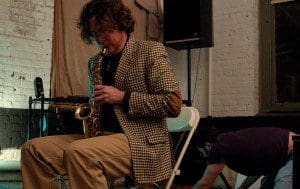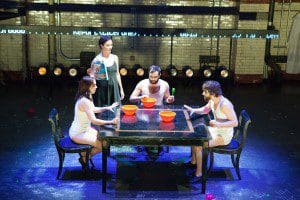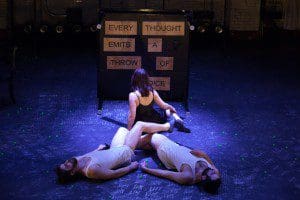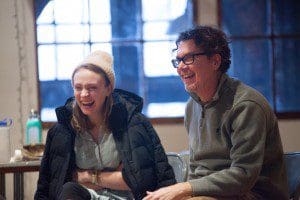Republished by kind permission from the FringeArts blog.
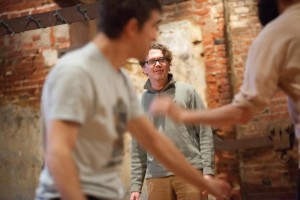
This week sees the premiere of New Paradise Laboratories’ O Monsters First Draft (tickets/info), marking the company’s second collaboration with award-winning composer, saxophonist, sound designer Bhob Rainey.
Rainey’s career is marked by a tireless push against preconceived notions of what music is and how it can effect listeners, and he has over 30 record releases to show for it. After earning a master’s degree in music composition from New England Conservatory (where he studied with musical luminaries Joe Maneri, Paul Bley, Ran Blake, and Pozzi Escot) he founded Nmperign with trumpeter Greg Kelley in 1998. The highly influential non-idiomatic improvisation duo have been integral to the development of the lowercase and electroacoustic improvisation genres and have to date collaborated with a veritable who’s-who of twenty-first century music innovators. In 2000 he founded The BSC, an octet of acoustic and electronic improvisers, as a means of exploring the dynamics of large group improvisation. Throughout his career he has sought interdisciplinary collaborations.
Though it is often the case that a composer’s work is done merely in service of a production, Rainey’s work on O Monsters First Draft has played an integral role in crafting this new work. “We’re treating Bhob’s music like spontaneous expressions of something in-the-world that can be used to craft out-of-this-world stage action,” Whit MacLaughlin, NPL’s artistic director, told FringeArts back in February. “Ultimately, we are exploring something we haven’t quite found a name for yet. Symphonic theater might be a good name for it.”
FringeArts caught up with Rainey to learn more about his background and his work on O Monsters First Draft.
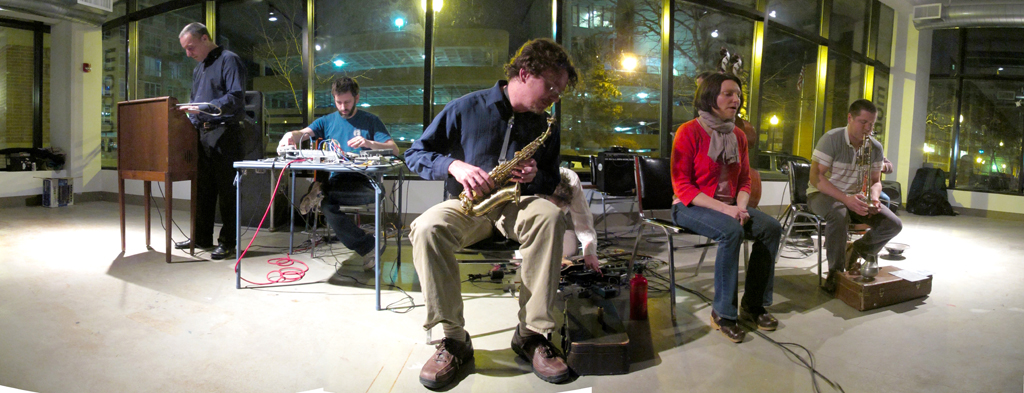
FringeArts: Were you raised in a musical household?
Bhob Rainey: Not really. My dad is something of an aficionado of certain music, mostly blues and jazz, but I don’t recall him sharing a lot of that when I was young. My mom would often play one side of a Barbara Streisand record followed by a side of Barry Manilow. No one in the family really knew what it was like to be a musician. It is very much to their credit that they didn’t disown me when I decided to go the music route. I got to know a lot of music through endangered species like radio, record stores, and libraries. I was usually attracted to things that seemed to push boundaries, though it took a while for my idea of boundaries to grow large enough to be interesting. In truth, so much of the richness of my musical experience as a kid came from going to a public school with a good music program. It’s unforgivable how much of that has been taken away.
FringeArts: Growing up in Philadelphia, were you involved with any of the city’s music scenes?
Bhob Rainey: I didn’t get involved with any significant music scene in Philadelphia until the mid-90s. This was the jazz scene in ’94–’95. The scene was generationally and racially diverse, so there was a lot of sacred knowledge being passed around. I grew a lot from the experience and am deeply appreciative of the musicians I played with. You had a few downtown clubs like Zanzibar Blue and the Blue Moon, plus the old Ortlieb’s and some more neighborhood-y clubs like Natalie’s in West Philly. I played with Orrin Evans, Edgar Bateman, Mike Boone, Byron Landham, Duane Eubanks, Mickey Roker, and some other scene heavyweights like Bootsy Barnes and Larry McKenna. Byard Lancaster was helpful to me early on, introducing me to other players like Lucky Thompson and being generally—and somewhat aggressively—supportive. I don’t think I ever thanked him to the degree I would have liked, and I regret that now. I was playing out most nights of the week, and I loved it. But it ultimately wasn’t my voice. It was a voice I had learned and enjoyed using. It was a tradition for which I had and still have a deep respect. But I had something else that I needed to do, and that’s when I left for Boston.
FringeArts: When did you resettle in Philadelphia, and what brought you back? And artistically, what are some of the differences between the cities?
Bhob Rainey: I have a couple friends who moved to Philadelphia from Boston. We were sitting in the FringeArts beer garden during the 2014 Fringe Festival, and one of them said, “Do you know what this reminds me of in Boston? Nothing.” Boston is a lovely city. It is well-manicured, walkable, full of winding streets and great bookstores. I know a ton of wonderful people there. But, like San Francisco, Boston long ago gave the finger to everyone earning less than six figures. It’s no place for an artist to live. There’s no O Monsters First Draft in Boston.
Philadelphia is full of trash and broken things. There can be an ambient pride in douchebaggery that is a little jarring. But it is fantastically dynamic and diverse. You feel a kind of honesty and squirmy vibrancy in all sorts of neighborhoods. And I fully comprehend how calling someone a jitbag is a way of saying “I love you.” Because my family and many old friends have always lived here, I never stopped coming back, and I watched how the city transformed. I saw how much the arts were central to that transformation. I wanted to be part of the whole thing, warts and all. I love being here.
FringeArts: Did you always have an interest in mediums of performing arts other than music?
Bhob Rainey: Yes. At this point, you could say that I’m more influenced by arts and non-art things that don’t go by the name music. I’m probably in the minority here, but I don’t think that music is a “performing art” any more than plumbing or reading a novel is a performing art. When we witness someone singing or interacting with an instrument, we aren’t witnessing some deliberately choreographed spectacle; we’re witnessing work. There is obviously something attractive and transfixing about watching this kind of work, but one can fully experience music without simultaneously seeing the labor of it. And, of course, there is now quite a bit of music that can be “sounded” without much visible human action.
FringeArts: What draws you to interdisciplinary collaboration?
Bhob Rainey: When you have music plus a bonifide performing art, you have a chance of amplifying music’s abstract qualities and making them felt. For music in contemporary culture, this is a big win. Audiences that would be gone in five seconds at a purely musical event will find themselves navigating complex and transgressive sonic structures with something amounting to pleasure. At least, that’s if everything goes well. One of the biggest challenges for me with interdisciplinary collaboration is that music has, by convention and perhaps nature, become subservient to image. So music is often watered down or comprised of well-known signifiers that can be quickly processed and then ignored. It is a testament to how easily music can disrupt our mental organization of the moment and how little we take advantage of that disruption.
FringeArts: How did you get involved with New Paradise Laboratories?
Bhob Rainey: I went to the PA Governor’s School of the Arts in 1989, and Whit MacLaughlin was a teacher there. I was involved in all sorts of nefarious shenanigans, and I suppose that left some impression. I think that, afterwards, Whit followed some of my work, and I followed his, due in part to a mutual friend, David Disbrow, whom I’ve known since kindergarten. When I moved back to Philadelphia in 2012, I had it in the back of my mind that I’d like to work with Whit some day. Then, out of the blue, he contacted me to see if I was interested in maybe pursuing some kind of collaboration. I suppose that we both had intuitions that there would be something synergistic, and, to my mind, that turned out to be true.
FringeArts: What draws you to NPL’s approach to theater and art-making?
Bhob Rainey: Whit and I share some basic impulses, something to do with rapid oscillations between the sacred and the profane. When we hear about some idea that seems both fantastic yet plausible, we immediately start experimenting without much regard for our own well-being. We get drunk on mystical shit but want to talk about it like normal people at dinner. We have giddy reactions to wild propositions that, because of slight generational differences, he might describe as psychedelic and I would describe as metal. And then, when it comes time to really form the work, we both become almost intolerable perfectionists. At least, I can barely tolerate myself.
FringeArts: Could you talk about the approach to crafting the music of O Monsters?
Bhob Rainey: The idea for the music was to reach towards things that were unhuman and find out how to exist in that territory. The music is an attempt to be consciousness-expanding without fearing really bad news about ourselves. It’s an acceptance of our monstrousness. I mean, consciousness is a screwy nut. The idea that the trauma of dying stars and cosmic collisions has somehow resulted in phenomena like Ashton Kutcher, ADD, and the stock market is almost too staggering to ponder. So, in making the music, I looked at a few phenomena that represent, to me, a certain unruly indifference that the universe holds towards our interpretation of it. Some were cosmic—NASA’s records of civilization-ending asteroids that have come a little too close to the earth since 1900—and others were human-made: internet traffic patterns, stock market prices, that sort of thing. The latter are especially telling in that they seem to be made by us and for us, but they don’t present themselves in a friendly, music-of-the-spheres sort of way. They are dirty, nasty, and have no apparent interest in our desires.
I used data from these various entities to structure long musical events. I sometimes used their numerical behavior to generate the fundamental sonic material (the “waveform”) from nothing. I tinkered with these recipes to find sounds and structures that were compelling but respectful of the original material—I have a pet peeve about taking weird data and forcing it into well-established musical forms. When I could find the music in these experiments, I started arranging things with the idea that I would retain the alien qualities while acknowledging that both the audience and me are stuck processing it with human consciousness. So, it is unforgivingly strange, but it rocks hard.
FringeArts: Whit MacLaughlin mentioned the company was creating sound poetry under your direction.
Bhob Rainey: Sound poetry was a precursor to concrete poetry and came out of various, mostly European, political and artistic movements. There are numerous approaches to it, but the one we’ve focused on has to do with viewing vocalization as an outcome of the body’s physical structure, rather than as a carrier for language. In the boring terminology of modern experimental music, this might be called “extended vocal techniques,” but that would be focusing too much on the sounds and not on how they’re used. We began by focusing on the work of two important sound poets: François Dufrene and Henri Chopin. We allowed their work to establish a territory so that we would have a jumping off point. Unsurprisingly, the actors had not been exposed to this type of work before, so it was helpful to have some killer examples.
At this point, because the sound is so reliant upon each individual’s body, the “sung” pieces are molded very personally to the actors. The vocalizations have both a material and ethereal nature, and the pieces are simple, strange, and fragile. I often find myself inexplicably moved when we rehearse them, partially because they are so vulnerable and partially because of how impressed and grateful I am that the actors were willing to follow me down this path. Within the play, these non-linguistic, untempered sounds, with seemingly bizarre purpose, give some resonance to the idea of being alien to ourselves. You don’t have to think about the strangeness of consciousness; it just appears.
—Hugh Wilikofsky

